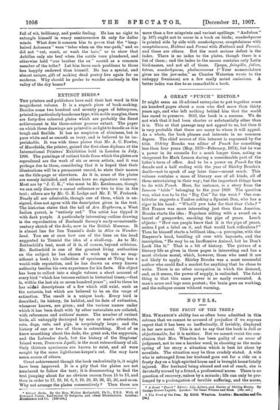A GREAT " PUNCH " EDITOR.*
IT might seem an ill-advised enterprise to put together some six hundred pages about a man who died more than thirty. years ago, and who left nothing behind him that the world has cared to preserve. Still, the book is a success. We do not wish that it had been shorter or substantially other than it is. This or that passage may not appeal to us, but then it is very probable that there are many to whom it will appeal. As a whole, the book pleases and interests in no common degree. The chief source of this interest is expressed by the title. .9Mrley Brooks was editor of Punch for something less than four years (May, 1870—February, 1874), but he was a power in its councils for a much longer time, acting as vicegerent for Mark Lemon during a considerable part of the latter's term of office. And to be a power on Punch for the decade and a half ending with the year of Shirley Brooks's death—not to speak of any later time—meant much: This volume contains a mass of literary ana of all kinds, all of them entertaining in their way ; but the important things have to do with Punch. Here, for instance, is a story from the famous " table " belonging to the year 1859. The question was, what was to be the "Big Cut" for the week ? One con- tributor suggests a 'Yankee asking a Spanish Don, who has a cigar in his hand : "What'll yew take for that thar Cuba ? " But France was more interesting just then than America. Brooks starts the idea : Napoleon sitting with a sword on a barrel of gunpowder, smoking the pipe of peace. Leech objects : "How can people know that it is the pipe of peace, unless I put a label on it, and that would look ridiculous ?" Then he himself starts a brilliant idea,—a porcupine, with the Emperor's head, bristling all over with bayonets, and the inscription, "He may be an Inoffensive Animal, but he Dou't Look like it." That is a bit of history. The picture of a literary life as given in these pages is interesting and has a most obvious moral, which, however, those who need it are not likely to apply. Shirley Brooks was a most successful author who could find a market for anything that he chose to write. There is no other occupation in which the demand, and, as it seems, the power of supply, is unlimited. The fatal thing is that this same power is so easily overrated. A man's arms and legs soon protest ; the brain goes on working, and the collapse comes without warning.














































 Previous page
Previous page